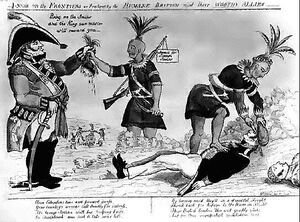French and Indian War
“Wow! I did not know the French could win a war. No wait, the French lost again.”
The most confusing war in history to an American is the French and Indian War (1754–1763), being that France and India did not fight each other. It is also known as the Seven Years' War as the action was timed like a football game with a starting and finishing time[1]. Most people are really surprised to find out that India was not even in this war, instead they where sitting at home, playing their sitar, while drinking fine Indian tea. When historians made up this war, they felt like being a little racist in the process and called the Native Americans, who actually fought in the war, Indians, being that they live the farthest from the country of India. The politically correct name for the conflict is The War When France and the Native Americans Gave Britain the Biggest Teabagging Party of All Time!!!!!!!!!!!111 [2]
The Early Years
In the early years, France was continually being snubbed by the Catholic-hating British, and thus declared war on them. [3] They had grown with knowledge, however, acquired in the Hundred Years War, and realized that No One likes to have a war in their backyard moved it over to a place where No One lives. No One did not like this very much, so after half a dozen chickens had been thrown, they moved the match over to the newly opened America.
The “Indians” Enter the War
When the war started, the Colonies were parts of England and Canada was part of France and because they spoke different languages, they obviously hated each other. The only thing these two countries had in common was that they hated the “Indians” for taking their God-given land. The only reason the "Indians" did not join the war as their own separate faction was the Colonies' national pastime, called Scalp a Native, which the Native Americans had a monopoly on before the Colonies came about. Therefore, they sided with the French because they liked their hair, and because the French were better at lying to their face about not taking the Native American land. It was not until the Native Americans came into the war that any fighting happened; this is because the English thought that the Native Americans, not having guns, would be easier to kill. This was farther from the truth than anyone (except the redskins) expected.
Major Battles
After the “Indians” took sides, the match was set. All that was left to do was to attack the Spanish, who were quickly disposed of; and then the real fighting began. In a series of major battles where the women were pillaged [4], the French and Indian War took its toll on the New World.
- The First Battle, 1754: Ironically not the chronological first battle (which was fought over Jesus in 1634 in Holland), the First Battle, which was at first only supposed to be gun show for the British to show of their amazing gunning power, turned bloody when the Native Americans wanted the same field to play their classic sport Rape a Hooker [5]. The British did not like this because they clearly had “official” paper work to be there and legally, at the time, only white men could rape hookers. The end result of this argument was a large pile of scalps and one lonely tuna fish sandwich, which now rests in a jewel-encrusted shrine in a Mormon church in Nebraska. 87 dead; 164 wounded; 3 raped
- The Battle of Waterloo, 1757: In this battle, named after the city of Waterloo, Iowa, saw the first African troops that the French posted. Other than being a great day for civil rights, it was a somewhat sad turnout. The French were more progressive than the British were, but not by much: for one, the French forgot to train the First African French Platoon in any form of fighting. Second, they stuck them in a fort in Waterloo, as far away from any other humans as possible. Third, they gave the British specific instructions as to where they were and precisely how to destroy the fort. On September 23, the entire fort was completely destroyed in a matter of about 15 minutes. The only survivor was a man name Jim, who was sainted in 1892, and subsequently shot in the balls, leaving him slowly to bleed to death. His death also marked the death of any hopes of France ever accomplishing anything in any way, ever. 768 dead, 39 wounded [6], 1 raped
Footnotes
- ↑ See Thirty Years' War for a similar joke
- ↑ When using the politically correct name, make sure to pronounce all the !s and 1s correctly.
- ↑ Like all good historians, I am not going to do any research on this topic and make something up that sounds good.
- ↑ ..and, sadly, no one was killed
- ↑ a game still popular today!
- ↑ All British soldiers who accidentally shot themselves.



